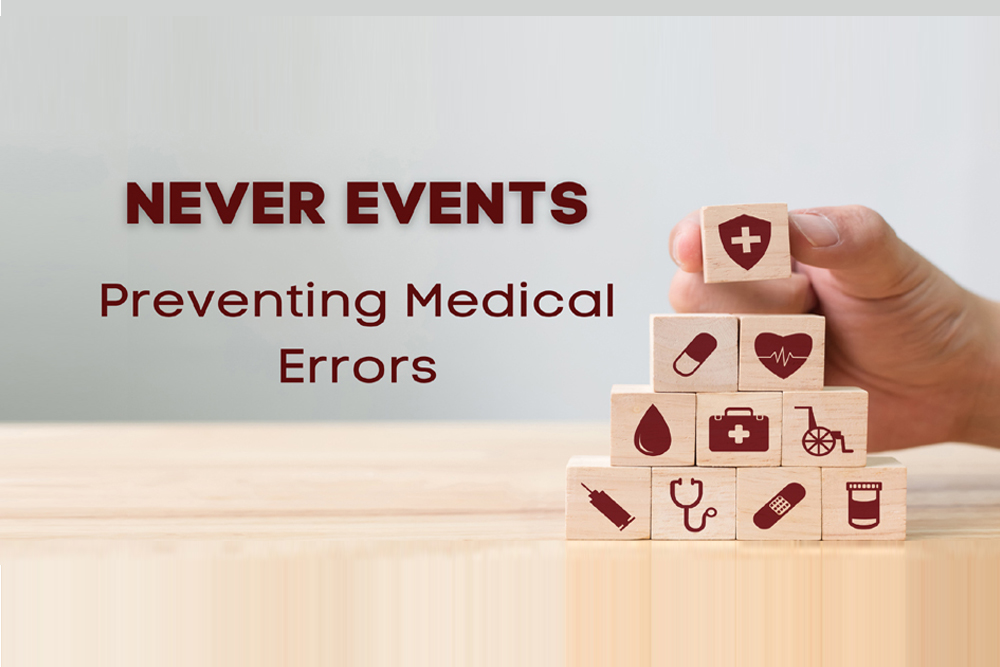
NEVER EVENTS: PREVENTING MEDICAL ERRORS
A 15-year-old girl was admitted to a reputed hospital after complaints of stomach ache. She underwent a strenuous operation under the care of world-renowned laparoscopic surgeons. Post-operation her vitals remained normal and she was recovering easily. She received post-surgery care and her doctors prescribed the necessary medications. She appeared to be healthy and her doctors expected complete recovery within a few weeks.
To everyone’s dismay, her condition deteriorated in the following week. She was readmitted after complaining of severe stomach pain. It came as a surprise to her family when they were informed that a pair of scissors had been accidentally left in her abdomen during the previous surgery causing inflammation, abscess formation, and infection.
She had to undergo another surgery that lasted around 2 hours to address the situation. Following the intense surgery, her condition stabilized slightly. It took more than 6 months for her to recover completely. She also missed celebrating her 16th birthday. Only after 8 months was she able to socialize and resume her daily activities.
Now, to a lot of you, this may come as a shock and you might assume that these events are quite rare. However, the reality is quite the opposite. Such events termed as ‘never events’, (events that theoretically should never happen) are very frequent in healthcare. According to a 2013 study, it was estimated that more than 4000 surgical never events occur annually in the United States.
What are Never Events?
In 2001 Ken Kizer, MD, former CEO of the National Quality Forum (NQF) introduced the term ‘Never Events’ about particularly shocking medical errors—such as wrong-site surgery—that should never occur. Over time, this term has actively been used to indicate adverse events that are unambiguous (clearly identifiable and measurable), serious (resulting in death or significant disability), and usually preventable. At present, the never event list consists of 29 “serious reportable events” grouped into 7 categories:
- Surgical or procedural events – These events primarily consist of surgery or other invasive procedures performed on the wrong patient, wrong body parts, or leaving a foreign object inside the patient after surgery.
- Product or device events – Such events can lead to patient death or serious injury due to contaminated drugs, device errors, or a wrong medical procedure.
- Patient protection events – Discharging patients who are mentally incapable to make decisions, patient suicide, or patient death due to elopement are a few primary events considered as patient protection events.
- Care management events – These events can lead to patient death or serious injury due to medication errors, unsafe administration of blood products, or staff failures in managing pregnancy events to name a few.
- Environmental events – Such events can lead to patient or staff death or injury due to electrical shock, toxic substances, and other equipment issues.
- Radiologic events – These events can lead to death or serious injury of a patient or staff due to the introduction of a metallic object into the MRI area.
- Criminal events – Such events can occur due to impersonation, abduction, sexual assault, or physical assault on patients or staff members.

Strategies to Prevent Never Events
Most Never Events are very rare. However, when Never Events occur, they are devastating to patients. Here are some common strategies to prevent never events:
- Standardization: Standardizing processes and procedures is an excellent way to reduce never events. Implementing checklists, protocols, and guidelines ensure that staff members follow the same procedures further reducing the possibility of never events.
- Technology: Technological advancements can help reduce the risk of never events. For example, electronic health records (EHRs) can prevent medication errors by providing real-time information about a patient’s medications and allergies.
- Precautions: Taking proper precautionary measures can effectively prevent never events. For example, Barcode scanning can effectively determine that the correct medication is being given to the right patient at the right time.
- Reporting: Incident reporting helps identify points of failure and develop strategies to tackle future events. Reporting of never events is essential to improving patient care by allowing clinicians to learn from past mistakes and facilitating the investigation of incidents.
- Education and Training: Education and training can help healthcare providers understand the importance of preventing never events and how to prevent them. This can include training on communication, teamwork, and patient safety culture.
Conclusion
Never events are a harsh reality plaguing the healthcare industry. Despite so many medical advancements, such events malign the hospital and doctor’s image. Implementing robust strategies to prevent near events should be a top priority for healthcare providers. Additionally, such incidents should be reported and patients should be compensated for such errors.

